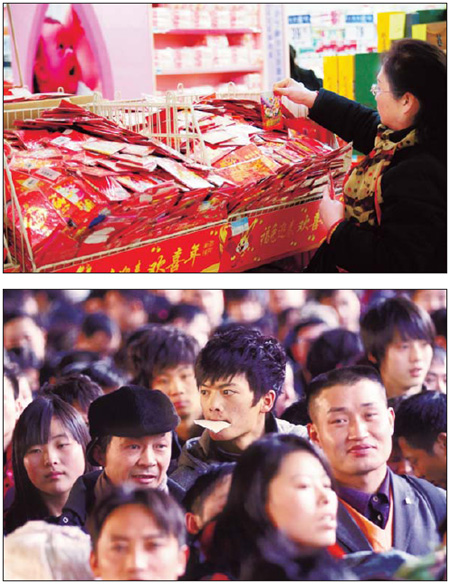Society
Rising cost of returning home for Spring Festival
By Cao Li in Beijing and Li Xinzhu in Shanghai (China Daily)
Updated: 2011-01-31 07:03
 |
Large Medium Small |
Ties get weaker
 |
|
Top: Money gifts will be placed in red envelopes (for luck) like these, at a supermarket in Guiyang, capital of Guizhou province. How fat or skinny the envelopes are is given great weight in many families. Shen Shijin / for China Daily Above: Thousands of people heading to their hometowns, gathered at the Beijing West Railway Station earlier this month. [Zou Hong / China Daily] |
To some, the pressure also comes from sustaining a decent city life while being bound to traditions they no longer cherish, said IT engineer Yu Yang, who works in a multinational software company's Beijing office.
"iPhone, iPad, name brands and girls - we have them all. Those are things young people vie with each other no matter where you are from," said Yu, who is 31 and from Inner Mongolia autonomous region. He recently purchased Apple's new tablet and is an active snow skier.
He described himself and many who were born in or after the 1980s, when the economy started to boom, as spoiled and spending more than they earn. "Without us spending money, the country's economy would not have grown so fast and the luxury market would not have been developed."
No one wants others to know they are from rural regions or a poor background, Yu said. What they have and what they wear are closer to conform to urban life. "It is about your face," he said.
To them, city life is much more appealing than the tradition of New Year or family, which is becoming distant to them. They spend most of their grown-up years in cities, where family size is smaller and connections to extended families are loose.
"People who save nothing just choose another time to go home (when money gifts are not expected)," Yu said. He also believes that nowadays, most families are well off enough that they don't actually need money from their children.
But older generations, who have more faith in tradition, disagree and believe that unwillingness to give money symbolizes a lack of gratitude from the younger generation.
He Xuesong, vice-dean of the school of social and public administration at East China University of Science and Technology in Shanghai, lauds the tradition. He blames the New Year pressure on a consumption-oriented economy that does not encourages savings.
To He, a 40-year-old from Anhui province, the tradition connects urban and rural regions and is a way to pay back rural residents for their contribution to the nation's economic development.
"It is the large number of immigrants from rural regions who have helped the city economies to develop most. And the New Year is the time for the city to pay back," said the professor, who goes home every year. "Young people suffer pressure no matter where they are. Taking more family responsibilities only prompts them to work harder and become better. Every young person has lived through such difficulties."
Much of their success in the city is from the sacrifice or contribution of their traditional families, said He Xuefeng, director of the China Rural Governance Research Center in Huazhong University of Science and Technology. He said he and many others in his generation (he is 43) are grateful to their families who supported them in higher education, which then provided them with the chance to migrate to cities.
Usually, rural families in poor regions can afford higher education for only one child, he said. The other siblings have to make sacrifices when the one, usually a boy with good school performance, is chosen to go to university. "Money-giving, usually to support their children in schooling, is a way to pay them back," He said.
With an annual income around 200,000 yuan, He supports the education of many of the next generation in his and his wife's families. "I don't think it will be a huge burden to young professionals in the cities," He said. "And once they have reached a stable stage of their career, the pressure will be less."
| 分享按鈕 |